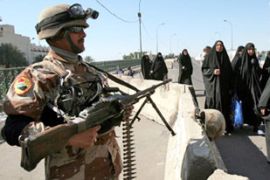Iraq’s neighbours meet in Baghdad
Explosions in the capital as delegates from Syria and Iran meet Iraqi and US officials.

Published On 10 Mar 2007
The blast hit an Iraqi patrol in Sadr City at midday, scattering burning debris across a small bridge, witnesses said.
An Associated Press reporter traveling with US troops nearby said the explosion showered shrapnel across a joint US-Iraq security station 300 meters away.
The partially shattered windshield of a car landed at the gates of the compound.
US open to ideas
David Satterfield, a US state department adviser on Iraq, said: “If we are approached over orange juice by the Syrians or the Iranians to discuss an Iraq-related issue that is germane to these topics – how to secure a peaceful, democratic Iraq – we are not going to walk away.”
| Your Views | ||
|
But Satterfield added that the US plans to use the meeting to reinforce its accusations against both nations.
Abbas Araghchi, Iran’s chief envoy, left Tehran Friday without directly mentioning the US, but said that Iran “hopes to take more steps” to support the US-backed government led by Nuri al-Maliki, Iraq’s prime minister and a Shia.
Security around the foreign ministry conference site has been intensified ahead of the one-day conference that will be attended by Iraq’s six neighbours, the five permanent UN Security Council members and several Arab representatives.
Accusations and demands
The primary purpose of the meeting, which has ample time scheduled for delegates to meet informally, is to pave the way for a later high-level meeting that may be held next month, but officials say the event will give an opportunity to air a wide range of concerns, including US accusations of weapons smuggling from Iran and Arab demands for greater political power for Iraq’s Sunnis.
|
“All the delegates are united by one thing: the fear of a prolonged civil war in Iraq. It would hurt them each in different ways” Abdel-Moneim Said, |
Iran has been a critic of the US military presence in Iraq, with its concerns growing after American forces detained two Iranian security agents at the compound of a major Shia political bloc in Baghdad in December.
Six other Iranians were arrested on January 11 at an Iranian liaison office in northern Iraq, with the US military saying they were members of Iran’s Revolutionary Guard. A charge Tehran again denies.
As well as its concerns over Iran, the US are expected to air claims that Syria allows Sunni fighters to cross its border into Iraq, and that weapon shipments from Iran are reaching Shia militias.
The US and Iran have shared interests in Iraq. Iran is keen for the US to crackdown on Sunni attacks on Iraq’s Shia population, while the US requires Iranian help to control Iraq’s Iranian-aligned Shia militias.
“Both Iran and the United States realise they are stuck together on Iraq,” said Alireza Nourizadeh, chief researcher at the London-based Center for Arab-Iranian Studies. “So perhaps they see this meeting as a way to open some doors for bilateral talks.”
Importance played down
The Baghdad meeting will be the first time in nearly two years that Washington has agreed to discuss security issues with Iran.
But George Bush, the US president, said on Friday during meetings in Brazil, that the message to Syria and Iran will not change at the Baghdad conference.
“We will defend ourselves and the people in Iraq from weapons being shipped in that cause harm; that we will protect ourselves and help the Iraqi people protect themselves against those who would murder the innocent to achieve political objectives,” Bush said.
The Arab League said this week that it would push for changes in Iraq’s constitution to give more political power to Iraq’s Sunnis, who are outnumbered nearly three-to-one by the Shia population, while Turkish officials say they fear oil riches for the Kurds could stir separatist sentiments that would spill over into Kurdish areas in Turkey.
“All the delegates are united by one thing: the fear of a prolonged civil war in Iraq. It would hurt them each in different ways,” said Abdel-Moneim Said, director of Al-Ahram Center for Political and Strategic Studies in Cairo. “Fear is the one thing bringing them all together.”
Source: Al Jazeera, News Agencies